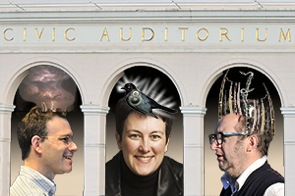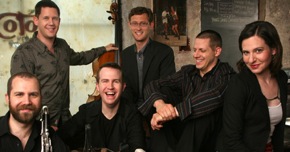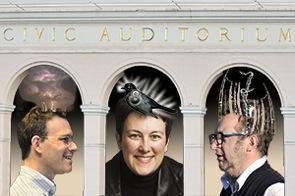Sure, the Cabrillo Festival showcased a trio of distinctive, lauded — and breathing — composers on its opening night program in Santa Cruz Friday. And yes, Music Director Marin Alsop and her band played their hearts out, as they usually do. But more impressive was the most neglected portion of the classical music communication channel: the audience. Why? Well, this will take a bit of explaining.

It was easy enough for many people to enjoy the 12-minute opening number on the program, Scherzoid (2003-2004), by the British composer Mark-Anthony Turnage. In his program note, the composer reveals that he took the work as “almost a test of whether I could write continuous fast music.” The result is a lively piece of swaggering energy, some of it not dissimilar to the “Jets and Sharks” prologue to Leonard Bernstein’s West Side Story. Particularly striking was Turnage’s writing for woodwinds, with the important addition of a soprano saxophone, plus some exciting orchestral down-and-up “slides” near the conclusion. Turnage himself was overjoyed with the festival orchestra’s preparation. “It’s fabulous to hear it played properly,” he remarked. “It’s electric, really.” No surprise here why attendees responded with a cavalcade of cheers.
Incessant Invention
Featured Video
eighth blackbird rehearsing Jennifer Higdon's
On a Wire at the 2010 Cabrillo Festival
It was even less of a surprise why the next work down the line, Jennifer Higdon’s On a Wire, written for the sextet named eighth blackbird, received a nearly unanimous standing ovation. Here the combination of Higdon’s incessant invention and eighth blackbird’s skill at extended instrumental technique created an atmosphere of complete engagement.
The composition began with the sextet gathered around a grand piano like a bunch of doctors and nurses doing a heart transplant in the O.R. Instead of suturing, however, they drew horsehairs around piano strings to “bow” the piano. Surprisingly, while the idea of putting things on strings inside a piano (“preparing” it) has been around for hundreds of years, and was popularized by John Cage beginning in 1938, the double-named composer Curtis Curtis-Smith is credited with the invention of piano bowing at as late a date as 1972 (see and hear an example).
The sextet worked their piano, with pianist Lisa Kaplan striking prepared keys to intriguing effect. After a couple of minutes the rest of the group went to their own instruments. Each was featured in solo sections, like a jazz ensemble. Most impressive were beautiful passages for viola, with bass clarinet accompaniment, played by Matt Albert and Michael J. Maccaferri, respectively. A plethora of percussive effects — not just by percussionist Matthew Duvall — added spice to the mix. Things were so beguiling stage front, thanks to Higdon and blackbird, that it hardly mattered that Alsop brought the orchestra in from time to time, for apropos (if subdued) accompaniment or commentary. Nor did even the musical substance matter much on first hearing, since everything was so absorbing and mellow. I wonder if repeated listenings to a recording would be nearly as rewarding as this live performance, which gave bowed-piano watchers bowed eyebrows of amazement, as well as ample reason to offer extended cheers and whistles before intermission.

Then, after everyone returned, refreshed and expecting more mellowness, came the premiere, a loin-girder of a Cabrillo-commissioned symphony, No. 3 by spoilsport Michael Hersch. Beginning with a minute of Psycho-like shrieks that could start a run on earplugs on lesser audiences had barkers been offering them, all motion died for two minutes. Suddenly, superdissonant zip-riffs were passed around among various instruments. Then gongs pealed. A foghorn trombone blew. Slow stuff ensued. Insistent, annoying drumming appeared, with four, six, and other groupings at a time. More quiet, dense “dirge-iness.” Then, 23 minutes in, a thick mud of climactic sound appeared. Strings trod. Wild bangs. Back to basses. Sudden, unprepared end at the 30-minute mark. Weak applause. Six or seven people stand up. Later, some 40 percent stand up to say good-bye. To a formerly fine evening?
Wrong! That evening and the next two days, I interviewed between 20 to 25 people who attended opening night. All but two or three liked the piece, and even the very few who didn’t told me they were glad to be exposed to it. Many spoke of its internal anguish. (Hersch has revealed little about the music other than it “was informed by a personal trauma.”) One woman declared, “I found it completely mesmerizing.”
Not a Critic Anymore
Here was a story that changed me from a critic to a reporter. I didn’t much like Hersch’s music. I found it too thickly orchestrated, lacking in much variety, urelievedly dissonant without a sense of progress. Seven movements of excessively consistent, unpleasant character, with a seemingly arbitrary end (“To be continued …,” said Hersch, a composer of a highly regarded 142-minute piano piece).
Yet indications are strong that there were probably 800 to 1,000 other people in attendance who may have been glad they heard it, and who even enjoyed it. This probability speaks reams for the success of Alsop’s almost 20 years with the Cabrillo Festival. If Hersch’s music had been performed in Phoenix, Dallas, or even San Francisco, it would have been easy to get folks to unleash diatribes at me about the evils of “modern music.”
With patience, tremendous charm, and a large smattering of audience-friendly works like those of Turnage and Higdon, Alsop has given more-severe artists like Hersch a chance for a fair hearing and, more important, sensitized her public to open their hearts and minds to new ideas.
She has changed them permanently, and made them better people than fuddy-duddy critics like yours truly.

